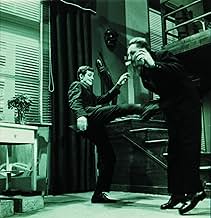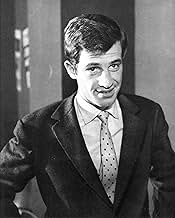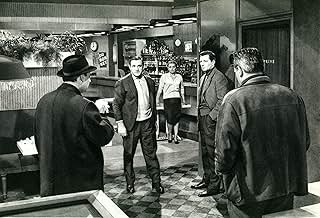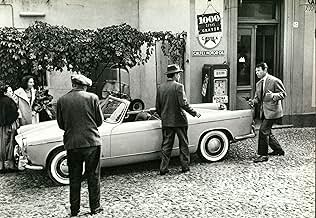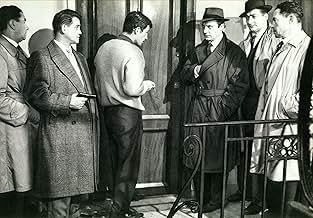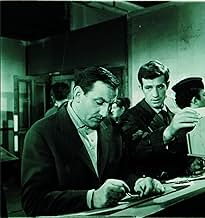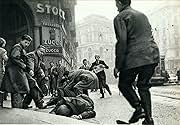VALUTAZIONE IMDb
7,5/10
4767
LA TUA VALUTAZIONE
Un criminale senza pietà è in fuga, ma gli imprevisti sono sempre di più.Un criminale senza pietà è in fuga, ma gli imprevisti sono sempre di più.Un criminale senza pietà è in fuga, ma gli imprevisti sono sempre di più.
- Regia
- Sceneggiatura
- Star
Simone Desmaison
- Thérèse Davos
- (as Simone France)
Jean-Pierre Zola
- Le patron de l'agence privée
- (as J.P. Zola)
Philippe March
- Jean Martin
- (as Aimé de March)
Recensioni in evidenza
Classe Tous Risques (The Big Risk) is repeatedly recommended every time I look up a Jean-Pierre Melville film that I had to give it a watch as soon as possible. Since I've been discovering Melville and seemingly working backwards through his filmography, it would be easy for me to mistake this as one of his films, but it was made in 1960, by Claude Sautet, before Melville would come and stake his claim on french neo-noir.
Classe Tous Risques has two of the best lead men of the time, Lino Ventura and Jean-Paul Belmondo. Ventura plays Abel, a gangster exiled in Italy with his wife and two kids, who wants to come back to Paris because the police are closing in on him. After a roaring and fast paced opening with a big surprise, Abel eventually gets hooked up with Eric Stark (Belmondo) who wants to get into the criminal underworld. Stark becomes Abel's chauffeur and eventual only friend in an underworld that turns it's back on Abel after everything he's done and been through. The film shows the the duality of the two men, the older Abel at the end of his time after tragedy strikes him, and the younger Eric starting off the same way Abel did, falling in love with a beautiful woman who sticks with her man despite the world they are a part of. It never ends pretty for them, or their loved ones. Its one thing to see a individual criminal come to his demise, its different when he has loved ones he risks taking down with him.
Much like Melville's film, the seemingly simple story gets more subtlety complicated as it goes along. As usual, as what I feel with Melville's films, it left my head spinning (in a good way) and dying to re watch it again to pick up what I missed the first time. Classe Tous Risques is a definite keeper.
Classe Tous Risques has two of the best lead men of the time, Lino Ventura and Jean-Paul Belmondo. Ventura plays Abel, a gangster exiled in Italy with his wife and two kids, who wants to come back to Paris because the police are closing in on him. After a roaring and fast paced opening with a big surprise, Abel eventually gets hooked up with Eric Stark (Belmondo) who wants to get into the criminal underworld. Stark becomes Abel's chauffeur and eventual only friend in an underworld that turns it's back on Abel after everything he's done and been through. The film shows the the duality of the two men, the older Abel at the end of his time after tragedy strikes him, and the younger Eric starting off the same way Abel did, falling in love with a beautiful woman who sticks with her man despite the world they are a part of. It never ends pretty for them, or their loved ones. Its one thing to see a individual criminal come to his demise, its different when he has loved ones he risks taking down with him.
Much like Melville's film, the seemingly simple story gets more subtlety complicated as it goes along. As usual, as what I feel with Melville's films, it left my head spinning (in a good way) and dying to re watch it again to pick up what I missed the first time. Classe Tous Risques is a definite keeper.
10Dziga7
I saw this film at Telluride Film Festival in 1997, where one of the screenwriters, José Giovanni, was being honored. It ranks highly as a great noir-crime-drama, incredible performances by Belmondo and Lino Ventura. The attention given to every character, and complex psychological portrayals, detailing loyalty, treachery, love, and hope, are tremendous. It is an excellent drama, an excellent thriller, and an excellent film. Up there with the best of Melville. (The title in English 'Class all risk,' in French 'Classe tous risques' is word-play on 'Classe Touriste,' meaning 'Tourist Class'.
I have just watched on Italian TV the excellent crime drama CLASSE TOUS RISQUES (1960; aka: THE BIG RISK), directed by Claude Sautet and starring the late Lino Ventura (in one of his best roles) and a very young Jean-Paul Belmondo.
This film came out at the tail end of a string of French gangster thrillers of the 50s, the most famous of which was, of course, Jules Dassin's seminal DU RIFIFI CHEZ LES HOMMES (1954; aka: RIFIFI). I haven't watched RIFIFI in a long time but I plan to acquire the Criterion DVD some time or other. In fact, I have only postponed it, really, because of the reported audio-synch problem present on the disc's first pressings and, being a non-U.S. resident, Criterion's policy dictates that no defective discs delivered outside Region 1 territories can be replaced! Still, in light of THE BIG RISK, I may risk it [sic] all the same!
When the film came out it converged with a spate of Nouvelle Vague releases including Jean-Luc Godard's A' BOUT DE SOUFFLE (1960; aka: BREATHLESS) starring, of course, Jean-Paul Belmondo himself. It is easy to assume that his characterization in THE BIG RISK is nowhere near as iconic as his Laszlo Kovacs in Godard's film, but after all his is a supporting role (albeit pulled off with confidence and charm) and he is all too obviously overshadowed by the underrated Ventura, who dominates the film from beginning to end. Ventura was a regular in gangster films of the period: he was in Jacques Becker's masterful TOUCHEZ PAS AU GRISBI (1953; aka: HANDS OFF THE LOOT!) playing the main villainous role and in which he conducts an effective vis-à-vis with nominal star Jean Gabin, but he then took the lead for Jean-Pierre Melville's magnificent thriller set in WWII, L'ARMEE' DES OMBRES (1969; aka: ARMY OF SHADOWS).
Incidentally, next week Criterion will release Melville's BOB LE FLAMBEUR (1955) and I hope they can put their hands on other films by this French master, notably LES ENFANTS TERRIBLES (1950), from the play by Jean Cocteau; LE DEUXIEME SOUFFLE (1966; aka: SECOND BREATH), also starring Lino Ventura; LE SAMOURAI (1967), his undisputed chef d'oeuvre; the aforementioned L'ARMEE' DES OMBRES and LE CERCLE ROUGE (1970; aka: THE RED CIRCLE). It is worth noting that the last two may very well be future Criterion DVDs. For the record, I have recorded ENFANTS, SAMOURAI, ARMEE' and CERCLE (which I have yet to watch) off French TV, along with the atypical LEON MORIN, PRETRE (1961) and the little-seen LE DOULOS (1962; aka: THE FINGER MAN), both of which star Jean-Paul Belmondo.
To go back to THE BIG RISK, it was dismissed at the time as old-fashioned in light of the Nouvelle Vague, though the few stylistic touches it has are effective exactly because they are sparse and unexpected. After an explosive start, the film relaxes its grip for the first half in order to establish plot (somewhat unusual in its emphasis on the domestic problems of gangsters) and characterization (particularly in eliciting audience sympathy for the lone anti-hero). The plot does have its improbable turns: for example, Belmondo's and Sandra Milo's characters are a bit too good to be true, aiding Ventura without batting an eyelid (despite the obvious danger involved) just minutes after making his acquaintance, while the ending is a bit of a letdown (the film is abruptly interrupted and the plot resolved with a hurried voice-over explanation)...but Ventura's solid performance as a man betrayed, quietly desperate at first but driven eventually to sudden eruptions of violence, holds the film firmly together and makes THE BIG RISK a classic of its kind.
Other films by Claude Sautet I have watched are LES CHOSES DE LA VIE (1969), MAX ET LES FERRAILLEURS (1971; aka: MAX AND THE SCRAP-MONGERS), CESAR ET ROSALIE (1972), all on Italian TV, and VINCENT, FRANCOIS, PAUL ET LES AUTRES (1974), which I have recorded off French TV. All of these are low-key yet very interesting and thought-provoking films, aided a great deal by a superb selection of actors (Michel Piccoli in CHOSES, MAX and VINCENT; Romy Schneider in the first three titles; and Yves Montand in the last two). VINCENT, FRANCOIS, PAUL ET LES AUTRES is perhaps Sautet's best film: it co-stars Serge Reggiani, Gerard Depardieu (one of his first), Marie Dubois and Stephane Audran (an extended cameo, really, but effective nonetheless).
As I have said, I wish that some of the films I mentioned by Claude Sautet and Jean-Pierre Melville, including of course THE BIG RISK, will one day be released on DVD. Supplements for such films may be hard to come by, I guess, but a quality print in the Original Aspect Ratio with a transfer to match are the least we could expect for them. I know that some of the above-mentioned films are already available on French Region 2 DVD but unfortunately most of them do not carry English subtitles. Although I do have quite a basic knowledge of the French language, I am still not fluent enough to get by without any subtitles. However, I would very much like to read your opinions of French Region 2 DVDs and will affect a search through the Mobius archives for that purpose, though I may still have to post my queries about particular French DVDs which I am interested in purchasing in a new thread in this Forum in the near future.
This film came out at the tail end of a string of French gangster thrillers of the 50s, the most famous of which was, of course, Jules Dassin's seminal DU RIFIFI CHEZ LES HOMMES (1954; aka: RIFIFI). I haven't watched RIFIFI in a long time but I plan to acquire the Criterion DVD some time or other. In fact, I have only postponed it, really, because of the reported audio-synch problem present on the disc's first pressings and, being a non-U.S. resident, Criterion's policy dictates that no defective discs delivered outside Region 1 territories can be replaced! Still, in light of THE BIG RISK, I may risk it [sic] all the same!
When the film came out it converged with a spate of Nouvelle Vague releases including Jean-Luc Godard's A' BOUT DE SOUFFLE (1960; aka: BREATHLESS) starring, of course, Jean-Paul Belmondo himself. It is easy to assume that his characterization in THE BIG RISK is nowhere near as iconic as his Laszlo Kovacs in Godard's film, but after all his is a supporting role (albeit pulled off with confidence and charm) and he is all too obviously overshadowed by the underrated Ventura, who dominates the film from beginning to end. Ventura was a regular in gangster films of the period: he was in Jacques Becker's masterful TOUCHEZ PAS AU GRISBI (1953; aka: HANDS OFF THE LOOT!) playing the main villainous role and in which he conducts an effective vis-à-vis with nominal star Jean Gabin, but he then took the lead for Jean-Pierre Melville's magnificent thriller set in WWII, L'ARMEE' DES OMBRES (1969; aka: ARMY OF SHADOWS).
Incidentally, next week Criterion will release Melville's BOB LE FLAMBEUR (1955) and I hope they can put their hands on other films by this French master, notably LES ENFANTS TERRIBLES (1950), from the play by Jean Cocteau; LE DEUXIEME SOUFFLE (1966; aka: SECOND BREATH), also starring Lino Ventura; LE SAMOURAI (1967), his undisputed chef d'oeuvre; the aforementioned L'ARMEE' DES OMBRES and LE CERCLE ROUGE (1970; aka: THE RED CIRCLE). It is worth noting that the last two may very well be future Criterion DVDs. For the record, I have recorded ENFANTS, SAMOURAI, ARMEE' and CERCLE (which I have yet to watch) off French TV, along with the atypical LEON MORIN, PRETRE (1961) and the little-seen LE DOULOS (1962; aka: THE FINGER MAN), both of which star Jean-Paul Belmondo.
To go back to THE BIG RISK, it was dismissed at the time as old-fashioned in light of the Nouvelle Vague, though the few stylistic touches it has are effective exactly because they are sparse and unexpected. After an explosive start, the film relaxes its grip for the first half in order to establish plot (somewhat unusual in its emphasis on the domestic problems of gangsters) and characterization (particularly in eliciting audience sympathy for the lone anti-hero). The plot does have its improbable turns: for example, Belmondo's and Sandra Milo's characters are a bit too good to be true, aiding Ventura without batting an eyelid (despite the obvious danger involved) just minutes after making his acquaintance, while the ending is a bit of a letdown (the film is abruptly interrupted and the plot resolved with a hurried voice-over explanation)...but Ventura's solid performance as a man betrayed, quietly desperate at first but driven eventually to sudden eruptions of violence, holds the film firmly together and makes THE BIG RISK a classic of its kind.
Other films by Claude Sautet I have watched are LES CHOSES DE LA VIE (1969), MAX ET LES FERRAILLEURS (1971; aka: MAX AND THE SCRAP-MONGERS), CESAR ET ROSALIE (1972), all on Italian TV, and VINCENT, FRANCOIS, PAUL ET LES AUTRES (1974), which I have recorded off French TV. All of these are low-key yet very interesting and thought-provoking films, aided a great deal by a superb selection of actors (Michel Piccoli in CHOSES, MAX and VINCENT; Romy Schneider in the first three titles; and Yves Montand in the last two). VINCENT, FRANCOIS, PAUL ET LES AUTRES is perhaps Sautet's best film: it co-stars Serge Reggiani, Gerard Depardieu (one of his first), Marie Dubois and Stephane Audran (an extended cameo, really, but effective nonetheless).
As I have said, I wish that some of the films I mentioned by Claude Sautet and Jean-Pierre Melville, including of course THE BIG RISK, will one day be released on DVD. Supplements for such films may be hard to come by, I guess, but a quality print in the Original Aspect Ratio with a transfer to match are the least we could expect for them. I know that some of the above-mentioned films are already available on French Region 2 DVD but unfortunately most of them do not carry English subtitles. Although I do have quite a basic knowledge of the French language, I am still not fluent enough to get by without any subtitles. However, I would very much like to read your opinions of French Region 2 DVDs and will affect a search through the Mobius archives for that purpose, though I may still have to post my queries about particular French DVDs which I am interested in purchasing in a new thread in this Forum in the near future.
"Classe tous risques" feels like the granddaddy of "The Sopranos" in mixing the criminal and the domestic, and of the buddy film to feel as contemporary as "Reservoir Dogs."
Even as these gangsters are affectionately entangled with wives, children, lovers and parents, they are coldly ruthless, and we are constantly reminded they are, no matter what warm situation we also see them in. They can tousle a kid's hair - and then shoot a threat in cold blood. The key is loyalty, and the male camaraderie is beautifully conveyed, without ethnic or class stereotypes, even as their web of past obligations and pay backs narrows into suspicion and paranoia, as the old gang is in various stages of parole, retirement, out on bail or into new, less profitable ventures. An intense accusation is of sending a stranger to perform an old escape scenario. It is a high point of emotion when a wife is told off that she's not the one the gangster is friends with, while virtually the only time we hear music on the soundtrack is when he recalls his wife.
Streetscapes in Italy and France are marvelously used, in blinding daylight to dark water and highways, from the opening set up of a pair of brazen robbers -- who are traveling with one's wife and two kids. Rugged, craggy Lino Ventura captures the screen immediately as the criminal dad. And the second thug is clearly a casually avuncular presence in their lives, as they smoothly coordinate the theft and escape, in cars, buses, on boats and motorcycles, in easy tandem. This is not the cliché crusty old guy softened with the big-eyed orphan; these are their jobs and their families and they intersect in horrific ways.
The film pulls no punches in unexpectedly killing off characters, directly and as collateral damage, and challenging our sympathy for them, right through to the unsentimental end, which is probably why there was never an American remake.
It seems so fresh that it's not until Jean-Paul Belmondo enters almost a third of the way into the film, looking so insouciant as a young punk, that one realizes that this is from 1960. Sultry Sandra Milo has smart and terrific chemistry with him, from an ambulance to an elevator to a hospital bed.
While the Film Forum was showing a new 35 mm print with newly translated subtitles, it was not pristine. The program notes explained that the title refers to a kind of insurance policy and is pun on "tourist class."
Even as these gangsters are affectionately entangled with wives, children, lovers and parents, they are coldly ruthless, and we are constantly reminded they are, no matter what warm situation we also see them in. They can tousle a kid's hair - and then shoot a threat in cold blood. The key is loyalty, and the male camaraderie is beautifully conveyed, without ethnic or class stereotypes, even as their web of past obligations and pay backs narrows into suspicion and paranoia, as the old gang is in various stages of parole, retirement, out on bail or into new, less profitable ventures. An intense accusation is of sending a stranger to perform an old escape scenario. It is a high point of emotion when a wife is told off that she's not the one the gangster is friends with, while virtually the only time we hear music on the soundtrack is when he recalls his wife.
Streetscapes in Italy and France are marvelously used, in blinding daylight to dark water and highways, from the opening set up of a pair of brazen robbers -- who are traveling with one's wife and two kids. Rugged, craggy Lino Ventura captures the screen immediately as the criminal dad. And the second thug is clearly a casually avuncular presence in their lives, as they smoothly coordinate the theft and escape, in cars, buses, on boats and motorcycles, in easy tandem. This is not the cliché crusty old guy softened with the big-eyed orphan; these are their jobs and their families and they intersect in horrific ways.
The film pulls no punches in unexpectedly killing off characters, directly and as collateral damage, and challenging our sympathy for them, right through to the unsentimental end, which is probably why there was never an American remake.
It seems so fresh that it's not until Jean-Paul Belmondo enters almost a third of the way into the film, looking so insouciant as a young punk, that one realizes that this is from 1960. Sultry Sandra Milo has smart and terrific chemistry with him, from an ambulance to an elevator to a hospital bed.
While the Film Forum was showing a new 35 mm print with newly translated subtitles, it was not pristine. The program notes explained that the title refers to a kind of insurance policy and is pun on "tourist class."
10urigafni
Odd one should be able to stumble into "Classe Tous Risques" only by chance; it should be on any "best of film-noir" list, including IMDb's.
Lino Ventura is as good as ever; knowing of his dire, delicate family situation gives extra weight to his almost expressionless face and brief dialogues. Belmondo's restrained performance under Sautet's firm direction only shows what a wonderful actor he could - and should -have been.
"Classe Tous Risques" is utterly mininal, dry and cold, without Melville's artistic scenery, pretty faces and fancy cars. It is almost film-noir meet neo-realism. Davos' few, hard words to his children describing their life of secrecy from there on get a hold on your throat to the end of the film.
The final sentence of the film - a voice-over telling of Davos' end in no more than ten dry, sombre words - leaves you with a hard punch in the stomach.
A true jewel in the great crown of French film-noir.
Lino Ventura is as good as ever; knowing of his dire, delicate family situation gives extra weight to his almost expressionless face and brief dialogues. Belmondo's restrained performance under Sautet's firm direction only shows what a wonderful actor he could - and should -have been.
"Classe Tous Risques" is utterly mininal, dry and cold, without Melville's artistic scenery, pretty faces and fancy cars. It is almost film-noir meet neo-realism. Davos' few, hard words to his children describing their life of secrecy from there on get a hold on your throat to the end of the film.
The final sentence of the film - a voice-over telling of Davos' end in no more than ten dry, sombre words - leaves you with a hard punch in the stomach.
A true jewel in the great crown of French film-noir.
Lo sapevi?
- QuizCo-writer/Director Claude Sautet said after the shooting that he did not know that the Abel Davos - Danos - character was inspired by a gangster who collaborated with the Nazis against French resistance and Jews during German occupation.
- Citazioni
Eric Stark: The best thing about me is my left hook.
- ConnessioniFeatured in Claude Sautet ou La magie invisible (2003)
I più visti
Accedi per valutare e creare un elenco di titoli salvati per ottenere consigli personalizzati
- How long is The Big Risk?Powered by Alexa
Dettagli
Botteghino
- Lordo Stati Uniti e Canada
- 132.928 USD
- Fine settimana di apertura Stati Uniti e Canada
- 11.945 USD
- 20 nov 2005
- Lordo in tutto il mondo
- 132.928 USD
- Tempo di esecuzione1 ora 50 minuti
- Colore
- Proporzioni
- 1.66 : 1
Contribuisci a questa pagina
Suggerisci una modifica o aggiungi i contenuti mancanti

Divario superiore
What is the Mexican Spanish language plot outline for Asfalto che scotta (1960)?
Rispondi



